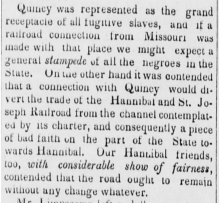DR. JETER'S LETTER.
Dr. JETER, it will be remembered, did not take any very active part in the Palmyra and Quincy Railroad scheme, and was absent from the House when the vote was taken on it. His conduct in reference to this matter, having been censured by the Palmyra press, he has since written a letter to B.H. JONES, Esq., editor of the Sentinel, in which he denies the charge of negligence brought against him, and proceeds to give a statement of the influences which led to the defeat of the project.––These influences are likely to operate in all future time, and the friends of the project had as well abandon it at once.
Dr. JETER, speaking of what he terms the illiberal course of the Missouri Legislature toward the Quincy and Palmyra Railroad says:
I propose to furnish you a brief statement of the influences which led to that result. Know then, these main trunks of railroads in Missouri are all directly or indirectly identified in interest with St. Louis, and that St. Louis and Quincy interests, so far as railroads in this State are concerned, are in direct conflict. Taking the Representatives from the counties along the different roads (with few exceptions) you may easily see when St. Louis is superaded where this large majority against Palmyra interests comes from.
Besides that add on the raw-headed and bloody-boned scarecrow of the slavery question, and you have cause sufficient to accomplish anything in the power of this Legislature. The slavery question with members of the General Assembly exercised an influence that may well be compared to the serpent in Eden, blending itself with every species of human motive and manifesting itself in every feature of human conduct.
Quincy was represented as the grand receptacle of all fugitive slaves, and if a railroad connection from Missouri was made with the place we might expect a general stampede of all the negroes in the State. On the other hand it was contended that a connection with Quincy would divert the trade of the Hannibal and St. Joseph Railroad from the channel contemplated by its charter, and consequently a piece of bad faith on the part of the State towards Hannibal. Our Hannibal friends, too, with considerable show of fairness, contended that the road ought to remain without any change whatever.
Mr. Limpscomb left a bill proposing to empower railroad companies to make connections with other roads where they could and conceived it to their advantage to do so.
Had this bill been left exclusively under my charge it would not have been brought before the House at all, for before it was presented I was fully satisfied it was simply useless to attempt its passage at present and might prejudice such an enterprise in future. So, becoming careless about it, it was brought up at a time when I did not expect it, and consequently caught me absent. This much I have though proper from me in explanation of what might otherwise seem inexcusable negligence on my part.
"Dr. Jeter's Letter," Hannibal, MO Messenger, March 19, 1857

